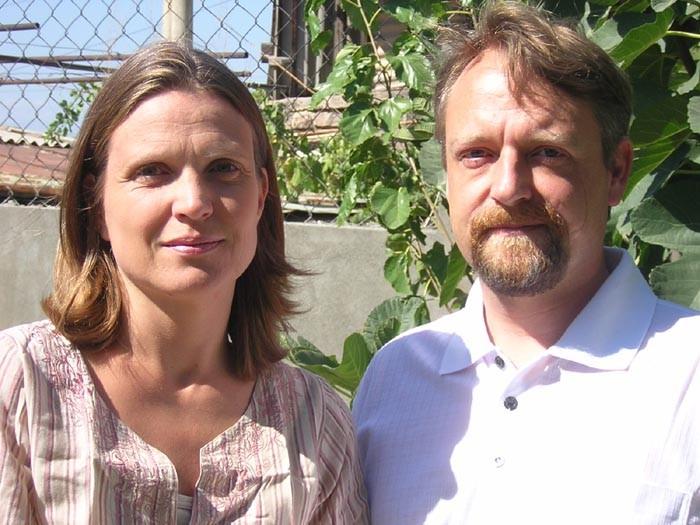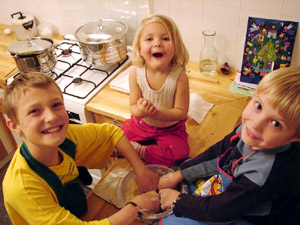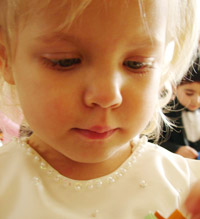
Make Yourself at Home
January. 4 a.m. The flight has been long and tiresome. They have only one wish: to reach home as soon as possible, warmth, sleep.
The airport is not attractive at all. It is somber, cold and dark. There are strangers around them, somber and exhausted as well. The people move slowly to the passport control window, to prove one last time their right to be in Armenia.
Finally the paper work is over and they come out. Not in a good mood at all.
And suddenly as if fireworks have gone off the middle of the dark silence of night. A group of people moves toward them, expressing their joy loudly, hugging them, shaking hands and talking all at the same time.
They do not understand a singe word of the bizarre language the Armenian friends who have come to greet them speak, but the unpleasant airport fills with warmth.
Culture shock in response to about Armenia's contrasts sets in before they leave the airport.
Some months ago the Danish-Armenian mission next to the Danish Church offered theologians Anna and Per Pedersons a job in Armenia. The organization, perhaps Denmark's tiniest, works for the establishment of good relations and friendship between the Danish Lutherian and the Armenian Apostolic Churches. Per Pederson's position would be advisor to the Armenian Catholicos.
The decision had to be made as soon as possible. In Denmark the Pedersons had a great job, a very nice house where they lived with their four children. The future in Armenia was not that clear. What little information they had from the Armenians working in the Mission was not enough for a complete image of the country they were going to work in, on a minimum five-year contract.
So what made them risk it and say yes?
 Life in Denmark was so prosperous, the future was so clear. Perhaps for this reason life had become a bit too routine? The trip to Armenia promised an adventure.
Life in Denmark was so prosperous, the future was so clear. Perhaps for this reason life had become a bit too routine? The trip to Armenia promised an adventure.
For the children, it would certainly be hard to leave their familiar life, school, friends: The Pedersons decided to sell their Danish house and told the kids that now their home was going to be Armenia.
Anna says they feel different from most foreigners living in Armenia.
"The children go to school here and the parents of their classmates always ask me, are you going to be here next school year? They seem to be in permanent "move out" mode; they came here for a job and they will leave for their homes in a while. We don't think of that "while". We are living here now and this is our home."
Anna and Per do not look at Armenia through the rose-colored glasses full of that unfounded optimistic admiration for Armenia that the most well-off foreigners living here have.
"I know how difficult life is in Armenia. I never criticize the Armenians who leave their country and move abroad, being unable to live here. We have been here for two years now, but perhaps, we would not have stayed here that long if we did not have good living conditions and this big house." (The Pedersens live in a three-story house provided by Danish-Armenian Mission.)
Within the first months, the cultural shock about Armenia carried on existing in their daily and professional life.
What was very strange was the familiar behavior of the locals towards children.
"In Denmark," Anna says, "nobody will caress a kid on head or hug him or her unless he asks the parent's permission. In Armenia, children are common property. The people here are especially fond of blonde children with blue eyes."
 But the younr Pedersens have already got used to the all the attention. They have Armenian friends and three-and-a-half-year-old Maiken goes to Armenian kindergarten.
But the younr Pedersens have already got used to the all the attention. They have Armenian friends and three-and-a-half-year-old Maiken goes to Armenian kindergarten.
Little Maiken, guessing that the adults' attention is on her, announces with a happy smile in Danish that today she had been skating at the ice-rink.
When I arrived at their house I asked her in English, "What is your name?"
She turned to Anna and said in Armenian, 'What is she saying? I don't understand.'
When the elder children play together they speak English; when they are with their Armenian friends they speak Armenian. And their parents communicate with them in Danish, so theuy won't forget their mother tongue.
What the Pedersons still cannot fully accept is Armenians' habit of always being late and often not keeping their promises.
"In Denmark if you are five minutes late for a meeting," Per says, "it is very rude, it means you do not care for the person. Here we were getting confused all the time; one one hand the people are so nice and warm to us and on the other, they do such things. But later we understood it is just a common cultural misunderstanding."
Per tells me that once he was invited at special service at Holy Echmiadzin at which lots of important people we going to be present. He was five minutes late. So he rushed to his friend's house, where he was to change his garments, without even saying hello, shouting, "Hurry up, help me, I am late!" The friend looked at him flegmatically and said, "Calm down, have a seat. Let's have some coffee."
"When I reached the church I was fifteen minutes late. Off course I was prepared for reproachful looks and words but everybody greeted me with a smile, saying "Hey, how are you?" as if nothing had happened."
"In Armenia I learned a new way to go to church," Per says. "Here you have different reasons for going to church, like to light a candle, to pray, for mass etc. You may enter the church and leave it ten minutes later. In Denmark, when we go to church, the full package is included. It seems to be a bus you bought a ticket for. Until it stops, you cannot get off. In Denmark the churches are even usually closed on week days."
In terms of religion,too, there is no lack of hilarious misunderstandings. Here Per, as a foreigner, is often asked what his religion is. When he was asked this question in Denmark he would say, well, I am a Christian and would ask back, what is your religion? I am also Christian, his interlocutor would answer. Here in Armenia when Per asks people back, they reply indignantly, "I am an Armenian!"
Yes, it is true, we always equate our religious identification with our national identification.
The culmination of Armenians' carelessness was the story of the carpenter Gevorg. A year ago Per ordered wood to make a kitchen table from the carpenter Gevorg, who has a workshop nearby.
"No problem," said Gevorg. "It will be ready in a week."
A week later, Per visited him and again received a promise that it would be ready in a week.
Thus weeks became months and one day Per discovered the workshop was not there anymore.
After a long search he found the workshop in its new location. The carpenter saw him and began to grouse about people who ordered something and didn't care about it. He swore he had called Per a thousand times but no one had answered.
"I really don't understand what had happened," says Per.
"Did you pay him in advance?" I guessed.
"Yes."
That is the answer.
Anyway, Gevorg again promised to give him the wood in a week. On January 14 th Per went to him. Gevorg opened the door with a swollen face, dimmed eyes. New Year celebrations were still on for him. So Per had nothing to do but to turn around and leave.
Finally in a week the wood arrived. Without the legs.
"We try hard to get to Europe, but are still so far yet, no?" I smile.
"I would say that Armenia is a synthesis of Europe and the East", says Per. "When you go to buy a window they show you the euro-window as the best. The word "euro" signifies quality here. And you gradually reach that quality. I would like Armenia to become Europe. Let us say, to become more structured.
"Here for instance in all organisations, be it religious or political or other, there is always an elderly man who decides everything.
"In Denmark when you apply for job you have to show your diploma and references, and it does not matter whether you are somebody's son or niece.
"In Europe when a politician has dirty hands he gets out.
"In Europe when you enter a state office they always welcome you with a smile, asking how can they help you. Here you have to wait untill a person finishes his coffee or whatever he's doing. Then he turns to you as if asking "What you want, why are you bothering me?"
"But Europe also has a lot to learn from Armenia," says Anna. "For instance in family relations. You are very solidar . In Denmark when people grow old they go to a home for old people. Not only because they need somebody to look after them, but also because they need communication, they need to have someone at least to watch TV with.
This loneliness is the reason that in Europe it is very common to see a psychiatrist. In Europe, they say do not think much, do not reflect on the past much because it is upsetting. Here you talk of your sadness, talk to your loved ones and thus find strenght to carry on.
I ask myself often how you manage to survive in such conditions? Perhaps because you are aware of your past, of the examples from your past, when your people were suffering but managed to survive and live on.
In Europe they would go crazy . Europeans don't know their roots, their past difficulties and heroes, so they cannot find sources for hope.
When I read your history my soul is moved. I do not claim I can feel what you feel but I understand your soul; perhaps that is why I feel home here."
Getting tired of adults' conversation Maiken starts writing in my notebook and singing. Astonished I find out the girl sings our National Anthem.
"It is her favorite song," Anna says. "She always sing it when having a bath."
How many Armenian children know their National Anthem by heart? I could not bring myself to call her a foreigner.
 Videos
Videos Photos
Photos
Write a comment